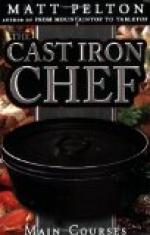“Juan spurred his horse, waved the scarlet cape aloft, took up a new position, and the people cheered. And again cheered as the bull charged, for once more Juan was safe away. Oh, Juan was the brave one! And Juan looked toward the other bull-fighters, as if to say: ’And now is not this Argentine a horse to talk about?’ And that horse Juan patted and whispered to, and laughed and sang to him; and with the reins taut in the left hand and the flaming cape always in his right, he did as he pleased with that bull. He talked to the bull, too, but differently—he knew how—to make him angry, and the bull frothed and tore up the sand to get at him, and a dozen times it looked as if the bull would bowl over and gore both the horse and Juan, but always just in time Juan flashed the red cape, and always he and the wonderful horse would come safe away. Juan was certainly the champion horseman of all that Cogan had ever seen. And when Juan rode out of the ring and the bull stood there and looked after him, bewildered like, Cogan didn’t half blame him, for the pair of them, Juan and his horse, certainly made a tough combination.
“And then into the ring came the capeadors on foot. Cogan took part with these. They were to play the bull on foot as Juan had been playing him on horseback, but instead of one there were eight of them in the ring together. And one after the other, five, ten, or a dozen paces away, they waved a red cape in front of the bull, at which he glared and lowered his head and charged; but always he charged in one way, head down and eyes only for the red cape, and there was the way the man beat the brute. The bull had his speed, strength, endurance, but nothing else. Once he put his head down he had eyes only for the red cape, and so long as the capeador handled his cape and himself with speed and skill, and no accident happened, he might count on getting safe away.
“Cogan only tried to repeat in the ring this day what he had been doing for weeks in practice. As the bull came charging, he used the cape to lead him to one side, allowing just room enough for the horns to pass. If he waited too long before he turned the bull, of course it would mean trouble; but if he turned the bull too soon, it would be clumsy. Whatever else he did the bull-fighter must not be clumsy. The first time he tried it, Cogan didn’t do a good job—the bull was faster than he realized, and he had to run for one of the little places of refuge with the bull after him. Then the crowd roared, or they yelled ‘Malo, malo,’ which is the same as if a crowd of baseball fans yelled ’Rotten, rotten!’ Next time Cogan did better, and then it was ‘Bueno, bueno!’ from everybody. Possibly the applause was all the louder because by this time the rumor had spread that he was not only a new-comer, a stranger, an American, but also a sailor, and these four thousand American sailors were this day the guests of the nation. Cogan could not help looking up to Valera and her father after he had done his good turn, and was thrilled to see them both cheering and smiling at him.




